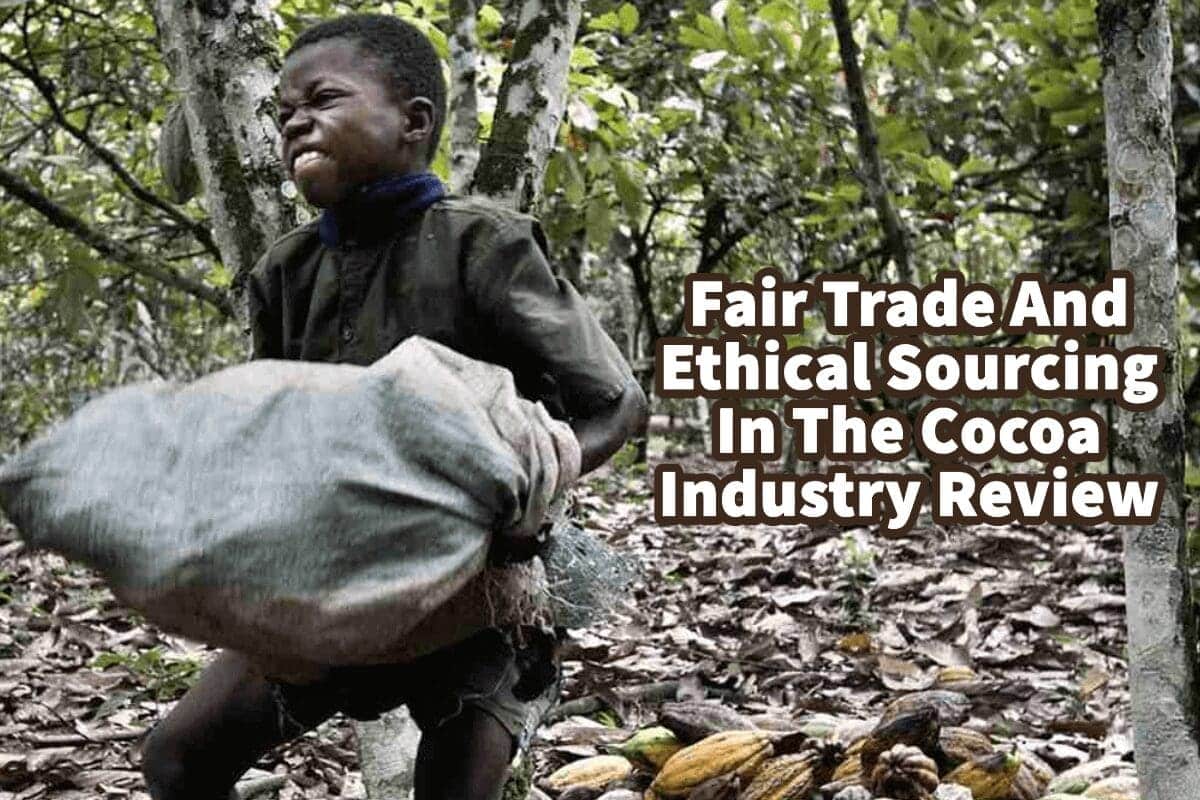There are things that every industry can learn about fair trade and ethical sourcing from the cocoa industry. The cocoa industry was hit hard by fair trade and ethical sourcing issues.
Fairtrade and ethical sourcing were not always part of the cocoa industry’s global supply chain. The initiative received some horrible publicity, mainly due to child labor and the low wages being paid to the farmers. The chocolate industry decided to be part of the solution, not the problem. Today, many large and small cocoa farmers and significant chocolate companies are working to ensure their chocolate is made with fair trade and ethically sourced cocoa. How the major chocolate companies have handled this is something that every company can learn why fair trade and ethical sourcing are essential.
Table of Contents
- What Is Fairtrade And Ethical Sourced Cocoa?
- Hershey and Mars Chocolate And Their Fairtrade Initiatives
- What Every Company Can Learn From Cocoa Fairtrade And Ethical Sourcing
- Related Content
What Is Fairtrade And Ethical Sourced Cocoa?
Fairtrade cocoa is a product harvested from a cocoa tree using a certified fair trade process that ensures the cocoa farmers make a fair living wage.
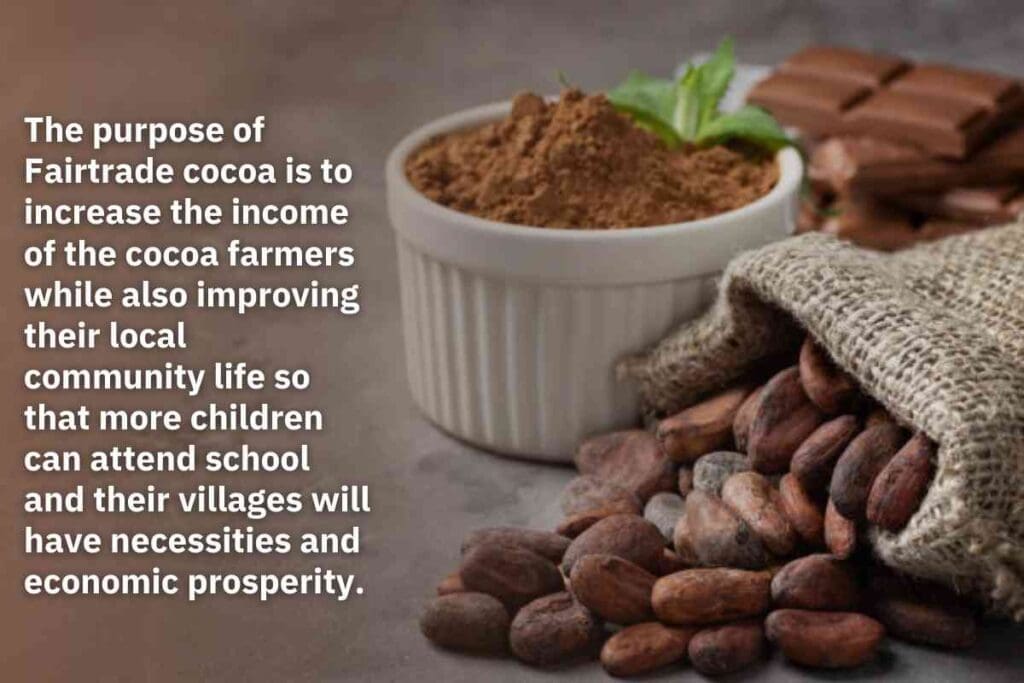
Fairtrade cocoa aims to increase the cocoa farmers’ income while also improving their local community life so that more children can attend school and their villages will have necessities and economic prosperity.
Companies that use Fairtrade Certified Cocoa ensure their cocoa sources use fair trade and ethical sourcing principles. The same companies can also advertise that their chocolate is made with fair-trade cocoa.
These fair-trade chocolate companies contribute to cocoa agriculture’s social-economic and environmental sustainability. In other words, they have ethical sourcing and fair trade in mind when purchasing cocoa.
Many other industries can learn from the cocoa industry and its fair trade and ethical sourcing practices. We can learn from the chocolate industry and how they had to change how they bought the cocoa to ensure it was fair-trade sustainable with ethical sourcing principles.
History of Cocoa, FairTrade, And Ethical Sourcing
In the 1990s, much of the cocoa sold to the rest of the world was produced using slave labor. Most cocoa farmers, particularly in West Africa, were forced to use slave and child labor as they earned less than 1 USD per day.
The farmers were pressured to keep their cocoa prices low despite an increasing need for fertilizer; many had to resort to hiring child or slave labor.
The world discovered that this unfairness in the chocolate industry was taking place; this left a mark on the chocolate industry. The chocolate industry decided they had to do something, so they set up what is known as the Fairtrade Cocoa Certification that was set up to help overcome these problems.
The idea was that chocolate companies would agree to buy cocoa they knew was certified with a fairtrade certification.
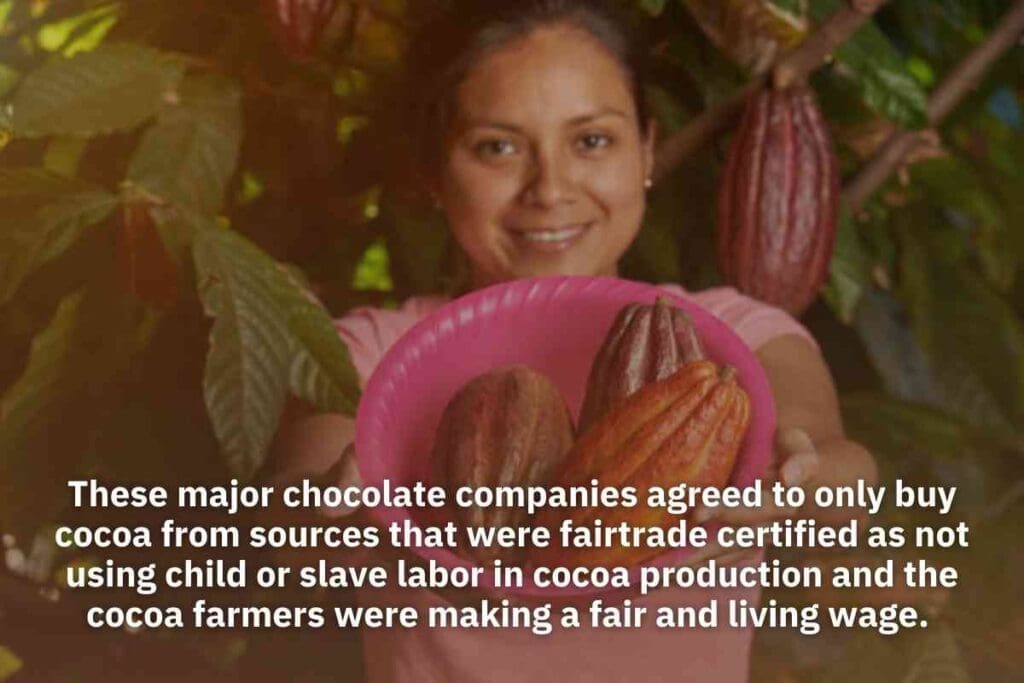
These major chocolate companies agreed to only buy cocoa from Fairtrade-certified sources and not use child or slave labor in cocoa production, and the cocoa farmers were making a fair living wage.
As part of the fair trade, the chocolate companies also wanted to ensure ethical sourcing issues such as deforestation were being looked at. Major chocolate companies agreed to purchase and become Fairtrade cocoa certified by 2020—two of the most notable are Hershey and Mars.
Hershey and Mars Chocolate And Their Fairtrade Initiatives
Both Hershey and Mars have reached their goal of purchasing Fairtrade-certified cocoa by 2020. Both companies have actively worked to improve their cocoa supply chain.
The cocoa industry has worked on fair trade and ethical sourcing issues for over ten years. Mars acknowledges that it still has work to do to ensure fair trade throughout the cocoa global supply chain.
On their website, Mars said this about their Cocoa Fairtrade initiative:
“Backed by a $1 billion investment over 10 years, Cocoa for Generations has two pillars: Responsible Cocoa Today and Sustainable Cocoa Tomorrow.
Mars Candy
Placing the interests of the smallholder farmer at its center, Cocoa for Generations is how we aim to step-change efforts and invite the cocoa sector to partner with us in a new approach to protect children, preserve forests and increase farmer income today, while creating a pathway for a more inclusive, modern and sustainable cocoa supply chain.”
Hershey Chocolate also has a similar initiative. Like Mars, they are ahead of schedule to ensure Fairtrade and Ethical sourcing throughout their cocoa supply chain.
One of the significant issues for chocolate companies has been child labor. Child labor has been a massive issue in the cocoa industry, particularly in West Africa. Many children and families are so poor that they may have little choice but to use their children to earn income.
Child labor has been an issue because many farmers would earn less than 1 USD daily before the Fairtrade and Ethical sourcing initiatives. Children were being forced to do a lot of hard and dangerous labor.
The cocoa farmers were pressured to keep their prices low, so they would employ the cheapest labor they could, usually children.
Hershey has said this is about their children’s labor initiative.
“Enhanced protection, detection and remediation of child labor. We are scaling our Child Labor Monitoring and Remediation Systems (CLMRS), the leading way to detect, remediate and eliminate child labor, across our entire West African cocoa sourcing supply chain by 2025. This includes engaging trusted members of farmers’ own communities in auditing farmers’ work practices and following up with them to find ways to help them lessen their reliance on the work of children (and keep children in school).”
Hershey Chocolate
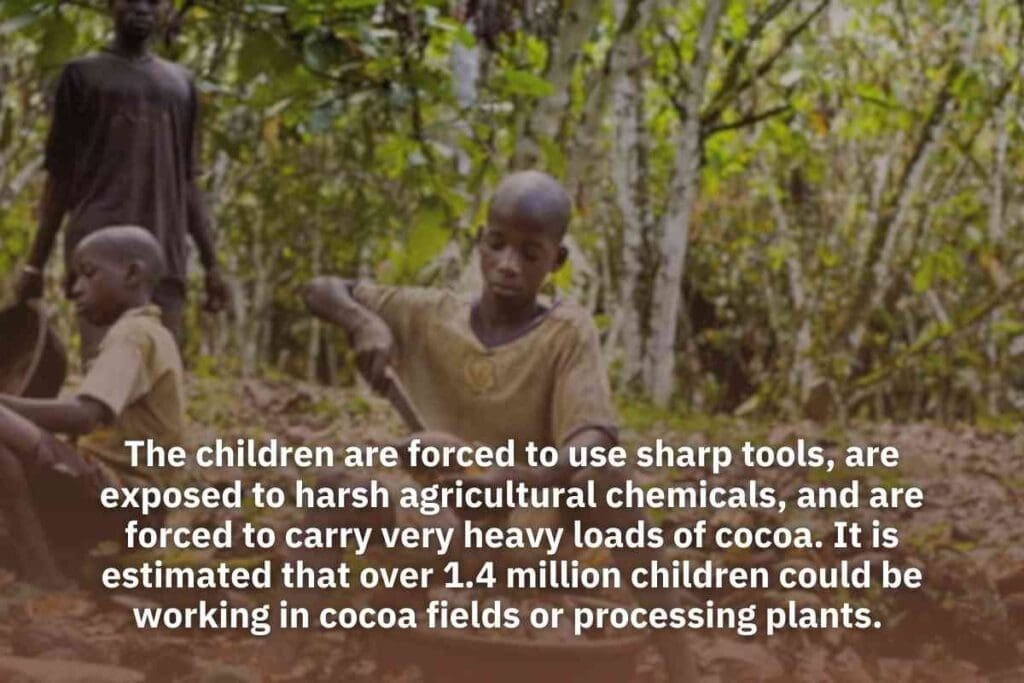
Child labor in the cocoa fields continues to be a huge issue. In some parts of Africa, children working is a way of life.
The children are forced to use sharp tools, are exposed to harsh agricultural chemicals, and carry heavy amounts of cocoa. Over 1.4 million children are estimated to be working in cocoa fields or processing plants.
Mars, Hershey, and other companies have said that they understand this is an issue for the cocoa industry, so they are working to solve the problems through fair wages, fair prices, ethical sourcing, and zero-tolerance child labor policies. However, despite the progress made, they still have work to do.
What Every Company Can Learn From Cocoa Fairtrade And Ethical Sourcing
Even if you are not in the cocoa industry or an industry where the words trade or ethical sourcing are never discussed, there are still things that everyone can learn from the Cocoa industry and how they have worked to tackle this problem.
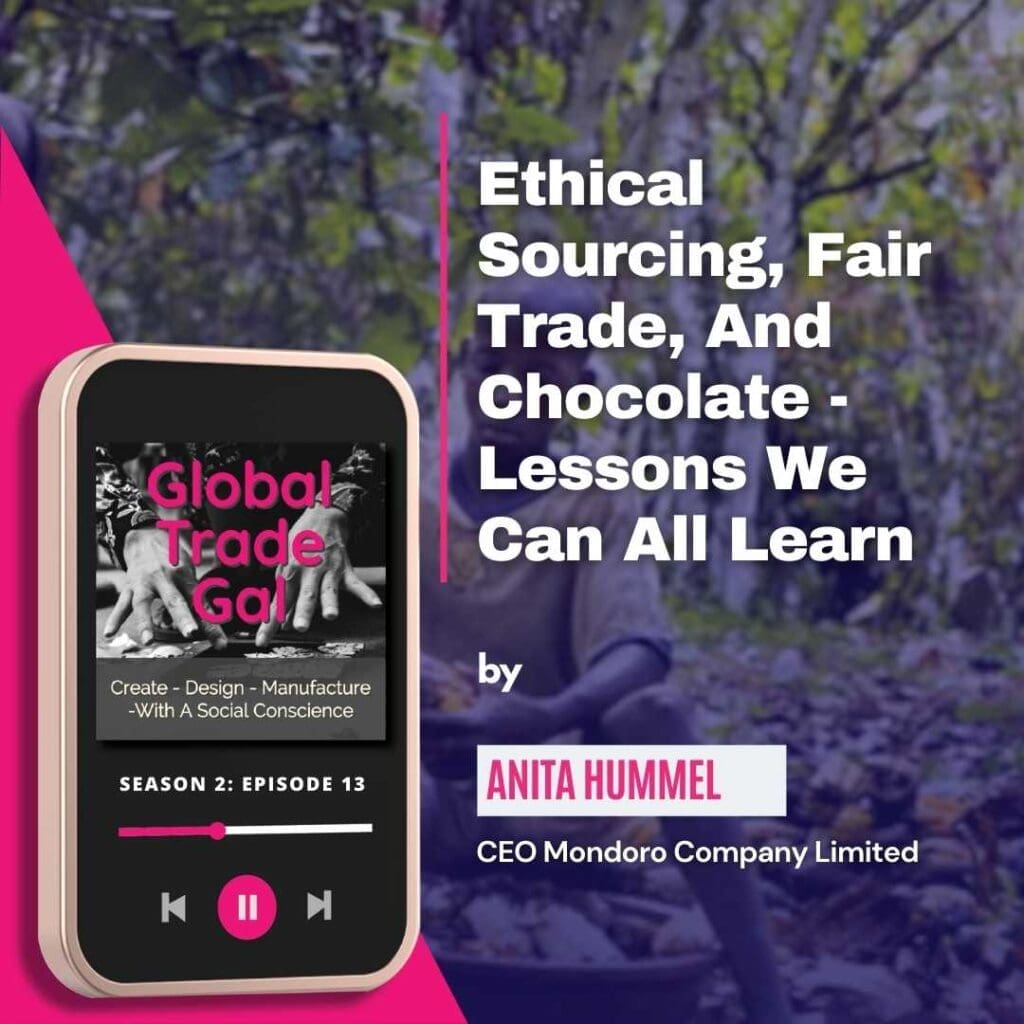
Listen To Our Podcast Ethical Sourcing, Fair Trade, And Chocolate – Lessons We Can All Learn Below or by clicking here.
Here are some of the things we can learn from the cocoa industry and their handling of fairtrade and ethical sourcing:
- Get In Front Of The Issue – Get in front of the issue. Even if your industry does not discuss ethical sourcing or fair trade, research has shown this will continue to become a significant issue. The time for you to start on this issue is right now.
- Acknowledge The Issue – Chocolate companies like Hershey and Mars have had to acknowledge the issue. Then they have told the world, look – we know it is a problem – but we are committed to finding a way to fix it.
- Define Your Solution – The cocoa companies have worked hard to define the solution. They have set up dedicated pages on their websites to talk about and discuss their progress and their solutions to the problem.
- Make It Part Of Your Brand – The cocoa companies made Fairtrade part of their brand and corporate identity. Many put it on their packaging to inform consumers that they ensure the cocoa is ethically sourced and Fair Trade certified.
The cocoa industry has shown us that “doing business while doing good” is a great way to do business. Having things like fair trade and ethical sourcing as part of your brand identity is essential for any large or small company.
We can all take the example of these large chocolate companies and ensure that fair trade and ethical sourcing are part of our entire supply chain.
Find out more about how Mondoro can help you create, develop, and manufacture excellent home decor and furniture with trade and ethical sourcing in mind – don’t hesitate to contact me, Anita. Check out my email by clicking here or become a part of our community and join our newsletter by clicking here.
Mondoro gives out a FREE Lookbook to anyone interested. You can receive a copy of our latest Lookbook by clicking here.
Listen to our Podcast called Global Trade Gal. You can find it on all major podcast platforms. Try out to listen to one of our podcasts by clicking here.
Subscribe to our Mondoro Company Limited YouTube Channel filled with great videos and information by clicking here.
Related Content
What Is The Difference Between Fair Trade And Ethical Sourcing?
Fair Trade is an organization that includes partnerships with marginalized and disadvantaged groups worldwide. The purpose of FairTrade is to help these groups to be able to have a more level playing field and ensure that they can earn a fair wage for the products they are offering. Ethical sourcing ensures that your global supply chain considers all your products’ global, social, and environmental impacts.
You can discover more by reading What Is The Difference Between Fair Trade And Ethical Sourcing? by clicking here.
Social Environmental Responsibility And Crime
Both Brass and Nickel are metal finishes that can be electroplated or plated. They contain copper and can be made into unique and exciting looks and finishes. Because of their versatility, they remain popular metals and finishes for various products and uses.
You can find out more by reading our blog Social Environmental Responsibility And Crime by clicking here.
How Social Environmental Responsibility Helps Fight Poverty
Social Environmental responsibility is about a company having social responsibility while being concerned about its environmental impact. A socially and environmentally responsible company will look at profits and benefit society while being responsible towards the environment.
To find out more about How Social Environmental Responsibility Helps Fight Poverty by clicking here.

